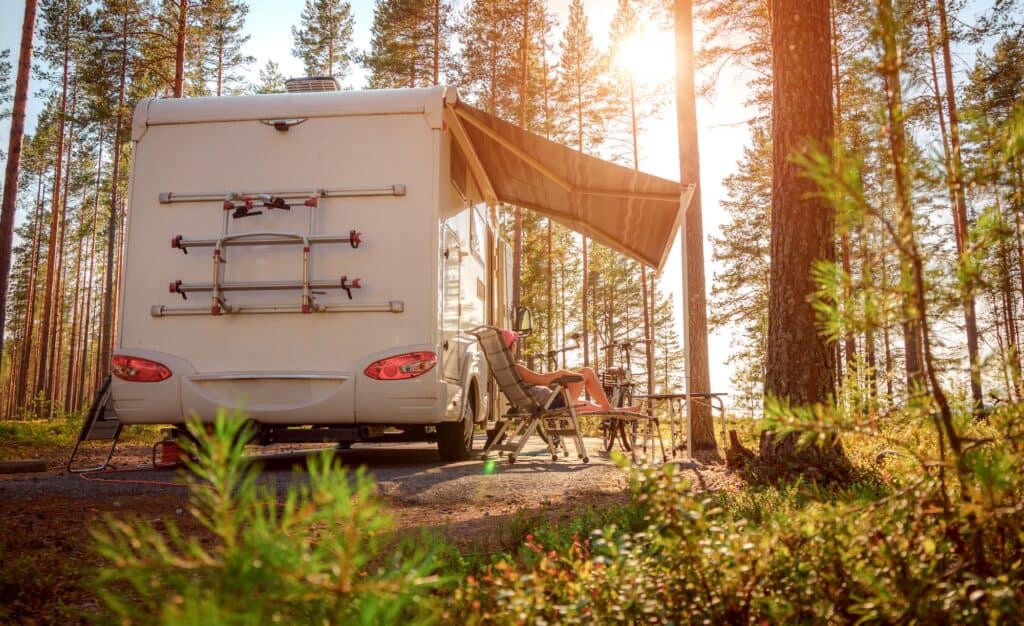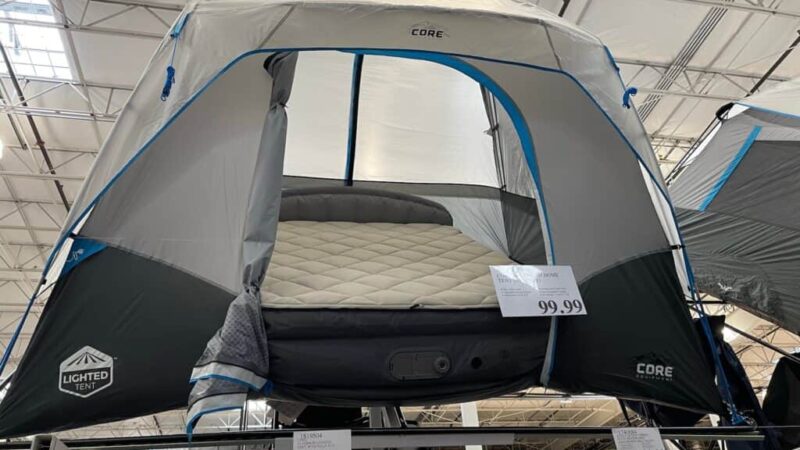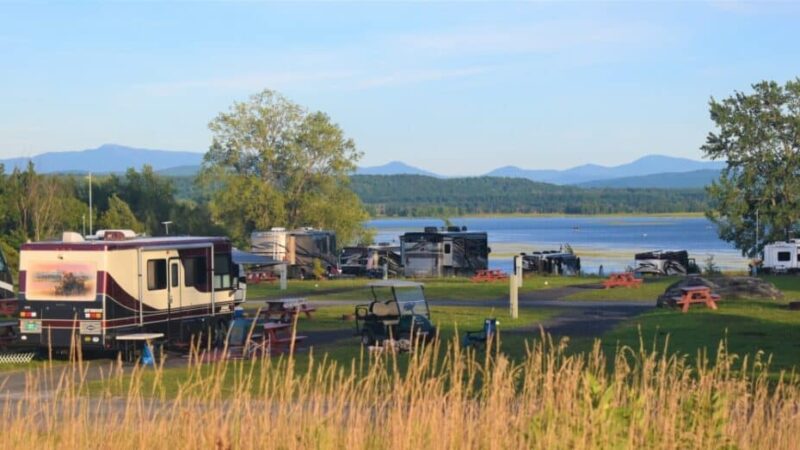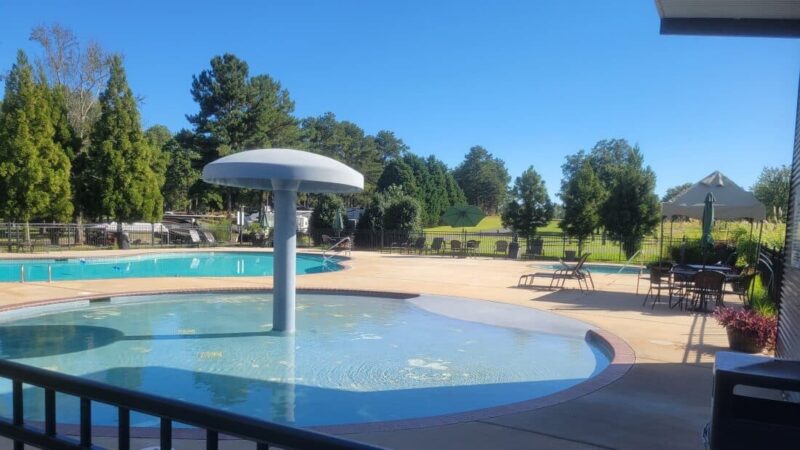Sustainable RV Travel: Tips for Eco-Friendly Adventures

Top Tips for Helping the Planet When You RV
The beginning of spring is a great time to plan summer RV adventures. And, with Earth Day upon us, it’s also a good time to discover new, environmentally friendly ways to enjoy RVing. Sustainable RV travel is all about making environmentally friendly choices. The goal is to minimize your environmental footprint while you explore new places or immerse yourself in the beauty of nature. Eco-friendly RV travel doesn’t have to mean buying an electric RV or all the latest eco-friendly gadgets. A lot of the time you’ll actually save money while you show Mother Earth some love. This guide offers practical tips for sustainable RVing- from fuel saving tips to practicing Leave No Trace principles.
Fossil Fuels
Our fossil fuel consumption is arguably one of the most significant environmental impacts on the planet. The production and use of fossil fuels has contributed to pollution and environmental degradation in myriad ways.
That being said, nearly every item in our everyday lives requires fossil fuels. Fossil fuels are used in manufacturing, transportation, or operation of nearly all consumer goods. They’re even required to manufacture green technologies like electric vehicles. Fossil fuels are also used heavily in the recycling process for plastics and other materials. While we may never completely eliminate dependence on fossil fuels, we can take realistic steps to decrease the quantity of fossil fuels that we consume. Here are some ways to do that.
Plan vacations close to home
Camping close to home instead of traveling out of town is an easy way to save fuel. Before you think you have to travel for hours to have a fantastic RV vacation, consider checking out local attractions and events in your area. That said, you might be surprised at what’s available locally. Not only that, camping close to home is also handy if you forget an essential camping item or two.
Reduce weight by traveling light
Your RV or tow vehicle will burn less fuel if it’s not working as hard. Consider lightening the load by bringing less (or at least more weight-conscious) stuff. You can also only fill your freshwater tank with the amount of water you’ll use (for people and pets) on the way to the campground.
Downsize to a more environmentally sustainable RV
Downsizing your RV can reduce fuel consumption significantly. For example,downsizing from a fifth-wheel to a truck camper or small travel trailer will make an appreciable difference in the fuel economy of your pickup. And in the case of motorhomes, a nimble little Class B van conversion will go through an awful lot less fuel than a big, bold, and bodacious Class A. While downsizing isn’t for everyone, many RVers who go from large RVs to smaller, lighter rigs report being happy with their decision. They appreciate their newfound ability to get into smaller campsites as well as the overall simplicity of the smaller rig.
Keep up with vehicle maintenance
RVs and pickups are designed for optimal operation when manufacturer-recommended vehicle maintenance is performed. Tuneups, fluid changes, and suspension system maintenance all play an important part in fuel economy. It’s important to keep up with these vital maintenance tasks on motorized RVs and tow vehicles.
But vehicle maintenance includes trailers, too. Aside from the dangers like tire blowouts and seized wheels, towing any trailer with bad wheel bearings or under-inflated tires will reduce fuel economy. RV LIFE Maintenance can help you to keep track of all of your RV maintenance tasks. It creates a customized schedule for your particular RV, even sending you email alerts when it’s time for maintenance.
Leave the vehicle at the campsite and go exploring on a bicycle
Riding a bike is a great way to see new places. Aside from being low-impact exercise, bike riding allows you to explore the world from a unique perspective while reducing the use of fossil fuels.
Avoid buying plastic products and packaging
Some 99% of plastics are made from fossil fuels in the form of petroleum products. Manufacturing plastics uses about 6–8% of the world’s fossil fuels. It’s estimated that this will increase to 20% in 20 years. This may not sound like a lot, but it’s enough to contribute 30–40% of the world’s greenhouse gases. Plastic doesn’t readily decompose either. Experts estimate that most plastics will last hundreds of years. That being said, some types of plastic can be recycled and made into a variety of consumer goods and packaging.
We may feel virtuous about choosing products made from recycled plastic. However, the truth is is that only 10% of the plastic produced gets recycled. The rest is discarded in landfills, oceans, and rivers or burned. The problem is each year, we add about 360 million tonnes of of waste to landfills. This amount increases each year. That being said, recycling plastic stil uses about 66% of the fossil fuels used to produce new plastics. The only answer to the looming so-called “plastic crisis” is to stop buying plastic consumer goods, especially those that come in plastic packaging. Here are some tried-and-tested alternatives to some household items we commonly use in RV living:
Laundry Detergent Strips
Also known as laundry sheets, space saving laundry detergent strips get clothes clean without plastic waste or harmful chemicals. Not only that, but they come in a small cardboard envelope that’s easy to stash in your RV.
Bar shampoo and conditioner
Bar-style hair products promise to make plastic shampoo and conditioner bottles a thing of the past. These space saving bars keep hair shiny and soft without any plastic.
Replaceable head toothbrushes
Replaceable head toothbrushes let you keep your toothbrush handle and just replace the worn out brush head. We love the fact that the handles are usually either aluminum or bamboo.
Beeswax Food Wraps
Put a wrap on plastic food storage wraps, bags and containers with beeswax wraps of all sizes and configurations. Cotton soaked in beeswax makes a fantastic food storage solution. It preserves food, washes well and takes up very little space in cabinets. Not only that, beeswax wrap configurations now include basic wraps, snack bags, and ziplock bags. Whichever one you choose will keep food just as fresh as plastic would, at a fraction of the cost to the environment.
Jute Storage Baskets
Jute storage baskets are a flexible alternative to plastic hampers and laundry baskets. They can serve multiple purposes in the RV and they’re so tough that they seem to last forever.
Shop smart, Buy Local
Buying locally grown and produced groceries wherever you are offers the the opportunity to try local cuisine at prices that don’t include costs associated with cross-country or international shipping. Not only that, but you’ll be supporting the local economy.
Leave your campsite better than you found it
We all enjoy camping in pristine, natural looking places. Nobody wants to pull into a campsite to find a fire pit full of trash and cigarette butts. Yet there are campers who leave campsites this way. Leaving a clean campsite is as simple as leaving the campsite with everything you brought to it. Unfortunately, sometimes it also means bagging up litter that less considerate campers left behind. If you love to paint rocks when you’re camping, be sure to take your creations home with you. No one appreciates your art more than you do. RVing is all about getting out and enjoying nature. Let’s all show Mother Nature some love by leaving places better than we found them
Use Earth-friendly cleaning and personal care products
Thousands of lakes and rivers are choked with overgrowth of blue algae each year. Blue green algae has always been present at low levels in most waterways, but it really takes off after phosphorus is released into the environment via runoff or rain. As it turns out. phosphorus originates from phosphates contained in fertilizers and some detergents and soaps.
Overgrowth of blue-green algae (also known as cyanobacteria) is nasty business. When phosphorus is plentiful, it continues to grow uses all available oxygen in a waterway. This of course decimates every other inhabitant of the waterway, makes the water undrinkable and unsuitable for swimming. But it gets even worse because blue green algae becomes poisonous when it blooms. It’s so toxic that it can kill pets along with any wildlife that tries to drink or swim in it. It’s bad stuff. But the negative environmental impact of blue green algae can at least be lessened (if not eliminated) by reducing the availability of phosphorus in waterways.
RVers can play a part in this by seeking out phosphate-free detergents, cleaning products, and personal care products. Surprisingly, many familiar brands of soaps, shampoos, and toothpaste contain phosphates, as well as non-biodegradable surfactants. Fortunately, avoiding phosphate-containing products is as easy as looking at the label. Many detergent and personal care product manufacturers have recognized the need for phosphate-free products. Look for products with the words “Phosphate free” on the label.
Let’s Make the World a Better Place
Sustainable RV travel isn’t just a pipe dream; it’s a rapidly evolving reality. By embracing mindful practices like conserving fuel, making environmentally conscientious buying choices, and minimizing our environmental impact, we can ensure that the wonders of the natural world will be ours to explore for generations to come. It’s a journey we all must take to preserve the natural wonders that we love. The future of RV travel, and the health of our planet, depend on it.
The post Sustainable RV Travel: Tips for Eco-Friendly Adventures appeared first on RV LIFE.
Source: https://rvlife.com/sustainable-rv-travel-tips-for-eco-friendly-rv-adventures/







